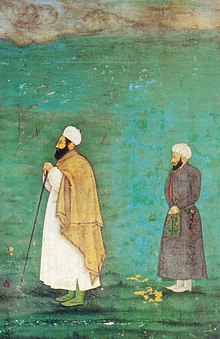
Back أحمد السرهندي Arabic İmam Rəbbani Azerbaijani আহমেদ সিরহিন্দি Bengali/Bangla Αχμάντ Σιρχιντί Greek Ahmad Sirhindi Spanish شیخ احمد سرهندی Persian Ahmad Sirhindi Finnish अहमद सरहिन्दी Hindi Ahmad Sirhindi ID Ahmad Sirhindi Italian
Shaykh Ahmad al-Faruqi al-Sirhindi
| |
|---|---|
 Painting of Shaykh Ahmad Al-Sirhindi c. 16th-17th Century | |
| Title | Mujadid-i-Alf-i-Thani (Reviver of the Second Millennium). |
| Personal life | |
| Born | 26 May[1][2] 1564[3]: 90 /1563[4] |
| Died | 10 December 1624 (aged 60) Sirhind, Lahore Subah, Mughal Empire |
| Era | Mughal India |
| Main interest(s) | Islamic Law, Islamic philosophy |
| Notable idea(s) | Evolution of Islamic philosophy Application of Islamic law |
| Religious life | |
| Religion | Islam |
| Denomination | Sunni |
| Jurisprudence | Hanafi |
| Tariqa | Naqshbandi |
| Creed | Maturidi[5] |
| Muslim leader | |
Influenced by | |
Influenced | |
Ahmad Sirhindi[a] (1564 – 1624/1625)[8] was an Indian Islamic scholar, Hanafi jurist, and member of the Naqshbandī Sufi order who lived during the era of Mughal Empire.[9][10]
Ahmad Sirhindi opposed heterodox movements within the Mughal court such as Din-i Ilahi, in support of more orthodox forms of Islamic Law.[11][12] His act of preserving and urging the practice of Islamic orthodoxy has cemented his reputation by some followers as a Mujaddid, or a "reviver".[13][14][15]
While early and modern South Asian scholarship credited him for contributing to conservative trends in Indian Islam, more recent works, such as Abul Hasan Ali Hasani Nadwi[16] and commentaries from western scholars such as Ter Haar, Friedman, and Buehler, have pointed to Sirhindi's significant contributions to Sufi epistemology and practices.[17][18][19][20]
- ^ Biography of Ahmad Sirhindi in Urdu Language Archived 21 June 2018 at the Wayback Machine
- ^ "Biography of Ahmad Sirhindi (Mujaddid Alf Sani)". Story of Pakistan website. June 2003. Archived from the original on 27 June 2014. Retrieved 17 July 2023.
- ^ Annemarie Schimmel. Islam in the Indian Subcontinent. ISBN 9004061177.
- ^ M. Sharif 1966, p. 873-883.
- ^ Bruckmayr, Philipp (2020). "Salafī Challenge and Māturīdī Response: Contemporary Disputes over the Legitimacy of Māturīdī kalām". Die Welt des Islams. 60 (2–3). Brill: 293–324. doi:10.1163/15700607-06023P06. S2CID 225852485.
- ^ مقالات الإسلاميين في شهر رمضان الكريم. IslamKotob. p. 123. Retrieved 16 December 2023.
- ^ Algar, Hamid (2000). Imâm-i Rabbânî (in Turkish). Vol. 22. Istanbul: Turkish Diyanet Foundation. pp. 194–199.
- ^ Muhammad Ali Jihad (2002). معجم الأدباء من العصر الجاهلي حتى سنة 2002 - ج 6 - محمد علي جهاد - و [Dictionary of Writers from the Pre-Islamic Era until 2002 - Part 6 - Muhammad Ali Jihad] (Paperback). IslamKotob. Retrieved 3 March 2024.
- ^ Shaykh Ahmad Sirhindi at the Encyclopædia Britannica. "Shaykh Aḥmad Sirhindī, (born 1564?, Sirhind, Patiāla, India—died 1624, Sirhind), Indian mystic and theologian who was largely responsible for the reassertion and revival in India of orthodox Sunnite Islam as a reaction against the syncretistic religious tendencies prevalent during the reign of the Mughal emperor Akbar."
- ^ Cite error: The named reference
polwas invoked but never defined (see the help page). - ^ Malik, Zubair & Parveen 2016, p. 158.
- ^ Malik, Zubair & Parveen 2016, p. 159-162.
- ^ Josef W. Meri, Medieval Islamic Civilization: An Encyclopedia, (Routledge 1 Dec 2005), p 678. ISBN 0415966906
- ^ Glasse, Cyril (1997). The New Encyclopedia of Islam. AltaMira Press. p. 432. ISBN 90-04-10672-3.
- ^ Annemarie Schimmel (2004, pp. 94, 132–133, 231)
- ^ Cite error: The named reference
نبذة عن الإمام أحمد الفاروقيwas invoked but never defined (see the help page). - ^ Ahmad 1964.
- ^ Friedmann 2000, New Delhi.
- ^ Haar & Friedmann 1992, Leiden.
- ^ Buehler 2011, Louisville, Kentucky.
Cite error: There are <ref group=lower-alpha> tags or {{efn}} templates on this page, but the references will not show without a {{reflist|group=lower-alpha}} template or {{notelist}} template (see the help page).